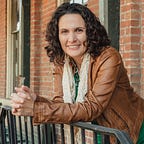What It’s Like to Pastor QAnon Believers
Pastors tend to the spiritual needs of their congregations. Conspiracy theories have made their jobs a lot harder.
Vicar Derek Kubilus, a United Methodist pastor, has one of those voices — knowing but full of levity. When we attended church camp together as teenagers, I often wondered if he was telling a joke I didn’t quite understand. Today, I hear a matured version of this voice on his podcast, Cross Over Q, which offers healing for QAnon followers and family members from a Christian perspective. On the podcast, his tone is heavier, that of a faith leader who’s been trying to hold his church through dual crises, a pandemic and spiritual upheaval as QAnon has torn churches and families apart.
To Kubilus, QAnon is a pastoral concern. He sees the movement’s conspiratorial thinking as heresy, a “spiritual pandemic” that is destructive to real people’s lives. Unlike so many pastors who have spent the past year weaving together Christian nationalism, Trumpism, and Q ideology, Kubilus is on the other side, trying to unravel these conspiracies and bring Christians back home.
A January survey by the conservative American Enterprise Institute showed that 27% of white evangelicals, 18% of white Catholics, and 15% of white mainline Protestants believe QAnon…
